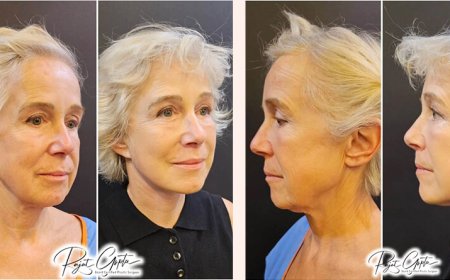Can Posture Affect Your Jaw Pain?
Struggling with jaw pain or clicking? TMJ treatment in St. Albert, AB offers effective solutions tailored to your unique symptoms and lifestyle.

Most people have jaw pain at some point during their lives, but there isnt any idea about what is causing it for all of them. If you usually have jaw pain, particularly when chewing or speaking, then your posture might be the cause. Poor posture can cause tension on your jaw, neck, and shoulders. This tension, over time, can impact the alignment of your jaw and lead to or make TMJ (temporomandibular joint) disorder-related pain worse.
If you are suffering from jaw pain, seeking assistance such asTMJ treatment in St. Albert,AB, can help. But its necessary for you to realize the link between your posture and your jaws health.
How Posture and Your Jaw Are Related
Your posture doesnt just affect your back or neck it can impact your entire body, even your jaw. When you slouch or hunch over, your head tends to push forward. This shift puts strain on your jaw muscles and TMJ, which attaches your jawbone to your skull.
With time, this forward head posture will misalign your jaw joint and muscles to result in pain, stiffness, and even a mouth opening or clicking sound. It can also make eating and speaking uncomfortable.
Why Jaw Alignment Matters
Your jaw needs to be in proper alignment to function well. When its out of placeeven slightlyit can lead to uneven pressure on the joint and surrounding muscles. This pressure can result in TMJ disorder, a condition that causes symptoms like
- Pain in the jaw, ears, or face
- Clicking or popping when opening your mouth
- Difficulty chewing
- Headaches or neck aches
Seeing a dental clinic can help diagnose whether your jaw pain is linked to posture or other dental issues.
Can You Improve Jaw Pain with Better Posture?
Yes, improving your posture can help reduce jaw pain in many cases. When you sit or stand tall with your head properly aligned over your spine, it takes pressure off the jaw. This relaxed position can ease muscle tension and allow your jaw to move more naturally.
LearningTMJ posture correctiontechniques and being aware of your daily habits, like how you sit at your desk or hold your phone, can go a long way in managing jaw discomfort.
How to Fix Bad Jaw Posture?
Correcting your jaw posture starts with correcting your overall body posture. Here are a few basic tips onhow to fix bad jaw posture:
- Sit and stand up straight with your shoulders back
- Keep your ears aligned with your shoulders.
- Avoid looking down at phones or laptops for long periods.
- Take breaks to stretch if sitting for hours.
- Keep your jaw relaxed, and avoid clenching.
Being mindful of these simple changes can take pressure off the TMJ and reduce jaw pain.
Try These Jaw Exercises for TMJ Relief
In addition to posture correction, there are also simplejaw exercises for TMJthat may help relax the muscles and reduce pain. Some examples include:
- Relaxed jaw exercise: Let your tongue rest on the top of your mouth and allow your jaw to relax.
- Goldfish exercises: Place one finger on your chin and another in front of your ear, then slowly open and close your mouth.
- Chin tucks: Pull your chin straight back to line up your head over your shoulders.
Always do these exercises gently and stop if you feel pain. Its a good idea to talk with a dentist or a physical therapist before starting a new routine.
When to Seek Professional Help
If your jaw pain lasts more than a few days or keeps coming back, you should talk to a professional. Some people try home remedies, but if those dont work, a proper checkup is important.TMJ Treatment Near Youmay include custom mouthguards, physical therapy, or other options that are designed to relieve pressure and help your jaw heal.
A professional will be able to tell if your pain is due to TMJ disorder, posture issues, stress, or another cause. They can then help you create a plan thats right for your specific situation.
Daily Habits That Can Make Things Worse
Sometimes, the things we do every day without thinking can make jaw pain worse. Try to avoid the following:
- Chewing gum for long periods
- Nail biting or chewing on pens
- Sleeping on your stomach with your head turned.
- Resting your chin on your hand while sitting
- Clenching or grinding your teeth (often happens at night)
Changing these habits can make a big difference in your comfort over time.
How Long Does It Take to See Improvements?
Everyones body is different, so the time it takes to feel better will vary. If you are working on posture and doing jaw exercises regularly, you may begin to see improvements in a few weeks. For some people, the pain goes away quicker. Others may need extra support through therapy or dental treatment.
Consistency is key. Stick with your posture corrections, avoid bad habits, and talk to a professional if your pain doesnt go away.
Take the Next Step Toward a Pain-Free Jaw Book Your Visit with Dentus Family Dental
Jaw pain can affect your everyday life, but help is available. If youre ready to find relief and want to better understand your symptoms, the caring team at Dentus Family Dental is here to support you. We offer expert evaluations and personalized treatment options that can address TMJ discomfort and posture issues.
Book yourappointmenttoday and take the first step toward better comfort and healthyour jaw will thank you!









































